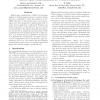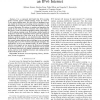12 search results - page 2 / 3 » Defending against hitlist worms using network address space ... |
ACSAC
2006
IEEE
14 years 1 months ago
2006
IEEE
Address-space randomization (ASR) is a promising solution to defend against memory corruption attacks that have contributed to about three-quarters of USCERT advisories in the pas...
MOBIQUITOUS
2005
IEEE
14 years 19 days ago
2005
IEEE
Caching techniques can be used to reduce bandwidth consumption and data access delay in wireless ad hoc networks. When cache is used, cache consistency issues must be addressed. T...
ADHOC
2008
13 years 7 months ago
2008
Caching techniques can be used to reduce bandwidth consumption and data access delay in wireless ad hoc networks. When cache is used, the issue of cache consistency must be addres...
INFOCOM
2005
IEEE
14 years 19 days ago
2005
IEEE
— It is a commonly held belief that IPv6 provides greater security against random-scanning worms by virtue of a very sparse address space. We show that an intelligent worm can ex...
INFOCOM
2003
IEEE
14 years 10 days ago
2003
IEEE
— It has been clear since 1988 that self-propagating code can quickly spread across a network by exploiting homogeneous security vulnerabilities. However, the last few years have...


